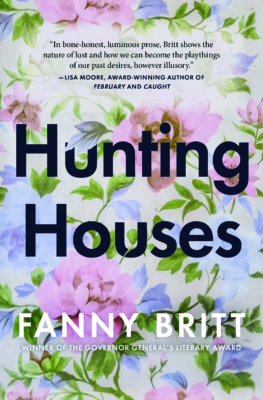When Tessa, a jaded Montreal real estate agent, meets her new client Évelyne, she is quick to diagnose the situation. “I do this week in, week out,” she says. “Guessing each client’s household drama has become second nature to me.” Divorce, of course, tops the list, and Évelyne, to whom Tessa mentally assigns a blubbering, “suffocating” husband, is no exception.
So begins Hunting Houses, the English translation of Quebec playwright and translator Fanny Britt’s first novel, Les maisons. Houses offer fertile metaphoric ground: objects for aspirations, empty containers until they are filled with dreams and desires, with projected futures, until daily laughs and tears have seeped into every crack in the foundation. A house can be revealing, baring intimacies real estate agents like Tessa are privy to on a daily basis. But it can also – and this, of course, is part of Tessa’s job – be highly curated, with a fresh facade to cover its blemishes, the dirty laundry shoved into the closet.

Hunting Houses
Fanny Britt
Translated by Susan Ouriou and Christelle Morelli
House of Anansi Press
$22.95
paper
254pp
9781487002381
Tessa never loses her tone of hyperbolic sarcasm, even when in pain: “The explosive contrast between the unfurling of my petty musings and the bottomless, secular silence that descends on me when the door opens is so marvellously tragic that I can’t even remember my own name.” Her humorous self-deprecation saves what could otherwise skirt melodrama. Britt has a keen eye for unveiling the perceived daily domestic failures and mounting guilt of a woman trying to juggle career, motherhood, marriage, and, of course, the resurrected passion that threatens to destabilize it all.
This is not, however, another novel about marital ambivalence. The passages describing Tessa’s love for her husband are among the most heartfelt in the book. Yet marriage and motherhood are not everything, and Tessa is plagued by a persistent, existential unhappiness, a dark cloud that extends back to her university years, when grief marked her seemingly irreparably.
And now one of the sources of that grief has come calling: “Friday, half past twelve, in front of Lenny’s,” Francis, the ex Tessa shares with Évelyne, proposes. The rest of the novel takes place in the intervening three days, the narrative alternating between Tessa’s past and present, and building up to a pivotal moment: will she or won’t she? Tessa’s reminiscences provide diverting back story, and before we know it we’re back where we started, with a decision that will impact the rest of Tessa’s life, a decision she contemplates while presiding over the school bake sale, coaching first-time buyers through an offer, enduring the humiliation that is bathing suit shopping, and even while, as she puts it, opening her thighs and inviting her husband in.
In occasional scenes presented almost entirely in dialogue, Britt’s background as an award-winning playwright is on full display; the reader is given a breather from Tessa’s inner monologue, and the narrative picks up pace. But it’s the insight into Tessa’s at times hypercritical thoughts that highlights the bifurcation of inner world, where everything seems imminently catastrophic, and outer self, where everything seems fine, picture-perfect even, something that’s hardly a foreign concept in our Instagram-primed culture. Which brings us back to the house metaphor. In Tessa’s case, it’s her dirty laundry strewn across the floor, her brutal honesty, that makes her so relatable. And that in turn is what makes Hunting Houses, skilfully and faithfully translated by Morelli and Ouriou, so engrossing. mRb






0 Comments